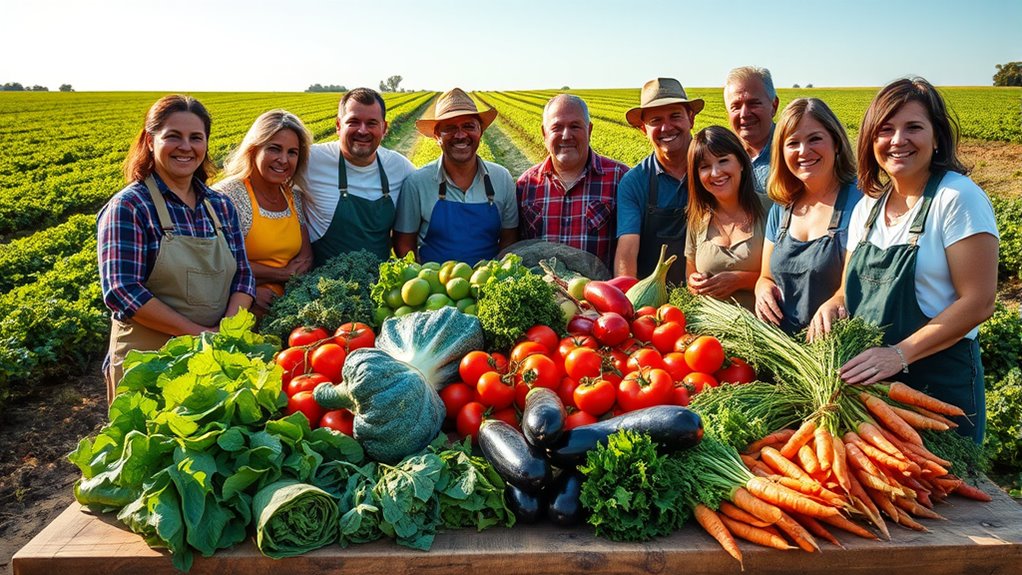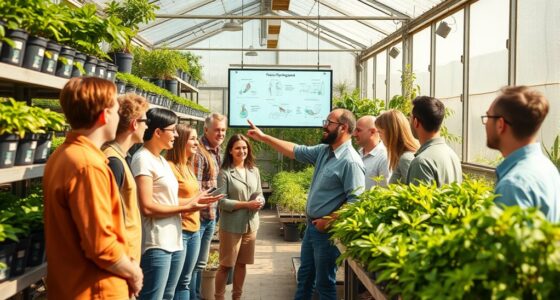Community Supported Agriculture can indeed transform your eating habits by connecting you directly with local farmers and encouraging seasonal, fresh, and sustainable foods. When you participate, you support eco-friendly farming practices, enjoy diverse, high-quality produce, and reduce your food’s carbon footprint. This relationship fosters transparency and trust, making your meals more mindful and community-centered. Keep exploring how CSA can reshape the way you consume and experience food on a deeper level.
Key Takeaways
- CSA fosters direct connections between consumers and farmers, encouraging more mindful and seasonal eating habits.
- It promotes access to fresh, locally sourced produce, enhancing food quality and nutritional value.
- CSA participation supports sustainable farming practices, influencing consumers to prioritize eco-friendly foods.
- It builds community around food, increasing awareness of farming processes and food origins.
- CSA models can shift consumer preferences toward supporting local economies and resilient food systems.

Have you ever wondered how you can enjoy fresh, locally grown produce while supporting your community? Community Supported Agriculture (CSA) offers a simple yet powerful way to do just that. When you join a CSA, you’re fundamentally becoming a partner in a local farm’s success. Instead of buying produce at the grocery store, you purchase a share of the farm’s harvest upfront. This arrangement provides the farm with CSA funding at the beginning of the season, helping them cover costs for seeds, equipment, and labor. In turn, you receive a weekly box of fresh vegetables, fruits, and sometimes even dairy or eggs directly from the farm. It’s a mutually beneficial relationship that emphasizes transparency, trust, and local resilience.
One of the key ways CSAs are transforming the way you eat is through fostering strong local farm partnerships. These relationships go beyond a simple transaction; they create a community around food. As a member, you get to know the farmers, learn about their growing practices, and understand the journey your food takes from soil to table. This connection encourages more mindful eating, where you become aware of seasonal changes, farm practices, and the importance of sustainable agriculture. Local farm partnerships also mean that your food isn’t traveling hundreds or thousands of miles—reducing the carbon footprint associated with traditional food distribution. Plus, because farms receive CSA funding upfront, they can plan better for the season, invest in eco-friendly practices, and avoid the pitfalls of fluctuating market prices. Additionally, these partnerships often incorporate alternative investments, which can help diversify farm revenue streams and promote resilience.
Joining a CSA doesn’t just mean healthier, fresher produce; it also means supporting the local economy. When you invest in local farm partnerships, you’re helping small-scale farmers stay afloat in a competitive market dominated by large agribusinesses. Your financial contribution through CSA funding provides stability, allowing farmers to focus on sustainable practices without the constant worry of market uncertainties. This stability often leads to better quality produce and more innovative farming methods, which ultimately benefits you as a consumer. Moreover, CSA programs often include educational events, farm tours, or volunteer days, deepening your connection and understanding of local agriculture.
In reality, CSA funding and local farm partnerships are reshaping how you access and experience food. They promote a more sustainable, transparent, and community-centered way of eating. By choosing to participate, you help build a resilient local food system that values quality, sustainability, and relationships. So, yes, community-supported agriculture can indeed change the way you eat—making it fresher, healthier, and more connected to the land and people who grow your food.
Frequently Asked Questions
How Does CSA Impact Local Farmers’ Income Stability?
Community Supported Agriculture (CSA) directly impacts farmers’ income and economic stability by providing a reliable revenue stream through upfront payments from members. You help guarantee farmers can plan for future harvests without relying solely on market fluctuations. This steady income reduces financial stress, encourages sustainable practices, and fosters community loyalty, ultimately strengthening local farmers’ economic stability and making their livelihoods more resilient in the face of economic uncertainties.
Are CSAS Accessible for People With Dietary Restrictions?
Imagine you have dietary restrictions, like allergies or specific preferences. Many CSAs are working toward inclusive access by offering customizable boxes or partnering with farmers who grow allergen-free or specialty produce. While not all CSAs currently cater to dietary accommodations, some are making strides to become more accessible. You can find or advocate for programs that prioritize inclusive access, ensuring everyone benefits from fresh, local food tailored to their needs.
What Is the Environmental Footprint of CSA Farms?
You might wonder about the environmental footprint of CSA farms. These farms often prioritize sustainable farming practices, reducing pesticide use and conserving resources. By focusing on local, seasonal produce, they lower transportation emissions and promote environmental health. This eco-friendly approach helps minimize negative impacts, making CSAs a more sustainable choice. So, when you participate, you’re supporting farming methods that are better for the planet.
How Do CSAS Support Community Building and Social Ties?
Imagine a web connecting individuals through shared values and experiences—this is what CSAs foster through community engagement. You meet neighbors during farm pick-ups, exchange recipes, and share stories about your harvests. These social networks strengthen bonds, creating trust and cooperation. By participating, you help build a resilient community where everyone feels connected and supported, transforming simple transactions into meaningful relationships that nourish both body and soul.
Can CSAS Help Reduce Food Waste in Households?
Community Supported Agriculture can definitely help you reduce food waste by encouraging better household habits. When you participate, you receive a variety of fresh, seasonal produce, which motivates you to plan meals and use ingredients efficiently. This reduces spoilage and prevents waste. The regular delivery schedule also promotes mindful consumption, making you more aware of your food usage. Over time, these habits can markedly cut down your household food waste.
Conclusion
So, can Community Supported Agriculture change the way you eat? It’s a simple choice that challenges the convenience of mass-produced foods, offering you freshness and connection instead. While supermarket aisles boast endless options, CSA farms remind you of the earth’s true bounty. By choosing local, you break free from the impersonal, commercial cycle, embracing a more mindful, nourishing way to eat—where community and sustainability meet, transforming your plate and your perspective.









